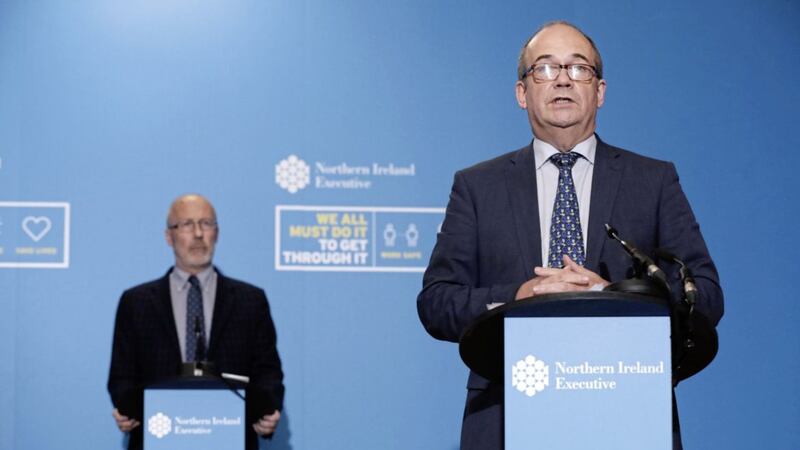NORTHERN Ireland is heading for 1,000 new coronavirus cases a day within a month's time if the public do not stick to new restrictions, a senior health advisor has warned.
Professor Ian Young said the "rapid rise" in infections meant the north is on track to exceed the "peak" hospital admissions of the first wave, when 300 inpatients were treated for Covid.
The Chief Scientific Advisor also said he "would not hesitate" to recommend a further tightening of restrictions in towns and cities worst hit by outbreaks, including Derry and Strabane where there has been a massive spike in infection rates.
Newry and the mid-Ulster area have also experienced substantial increases within the last week.
In a joint media briefing yesterday, Professor Young and Chief Medical Officer (CMO), Dr Michael McBride, pointed to the stark differences across council areas and singled out Mid and East Antrim, where there has been a 50 per cent drop in new cases across Ballymena since new measures were introduced a fortnight ago.
They also said it will be a "minimum of one week" before the impact of restrictions on transmission rates are seen - and that any further measures must be "proportionate" while taking into account the mental health needs of the population as well as the economy.
In relation to the Derry/Strabane outbreak, the vast majority of cases have been traced to "social interactions and gatherings" including "celebratory events" in households, they noted.
"It will be closer to two weeks before we can make any estimate of the effect of restrictions that have been introduced. We need to bear that in mind when monitoring the numbers in Derry and Strabane and other areas," Professor Young said.
"Nonetheless, I think the CMO and myself are agreed that if we are particularly concerned then we won't hesitate to recommend to the executive additional restrictions that might be required in any area Northern Ireland wide."
He added that the only virus in the world ever to have been eradicated is smallpox - and that we need to learn to live with coronavirus, with the wait for an "effective vaccine" six to nine months away.
"The Covid virus is going to be with us forever, for the rest of our lives, and the question is how much of it will there be?" he added.
With the north's infection rates remaining higher than England, Scotland, Wales and the Republic - they were the lowest in mid-June - the importance of an effective testing/contact tracing system was also outlined yesterday.
Concerns about access to tests and contact tracing have been expressed in recent weeks.
Dr McBride confirmed that 20 health professionals, including some dentists and junior doctors, were interviewed earlier week this as part of a recruitment drive by the Public Health Agency, which runs the contract tracing service.
The north's most senior doctor also said he was confident we will be in a "different place" by next March following "significant inroads" in treatments and the development of a vaccine.
"As a population, we need to believe there is an end in sight to all of this...this virus isn't going anywhere and it is about us adapting our lives," he said.
"...But we will see from the new year supplies of vaccines that have gone through rigorous trials and safety assessments becoming available," Dr McBride said.
"That's why I'm optimistic that the winter after this will be entirely different than this one. This will be one of the most challenging autumns and winter periods. I'm very confident that next spring we will be able to see an improving situation.
"It's a hell of an ask for the the population to stick with - and I think people need to see some light at the end of the tunnel because we cannot ask people to continue to do this indefinitely."







